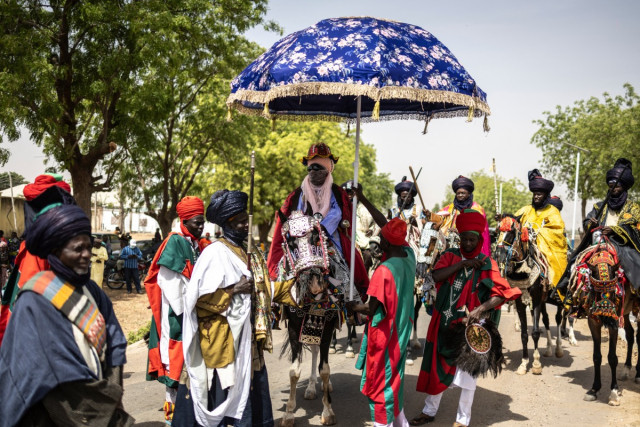DUTSE, Nigeria - Women with veils cried out joyfully as the sounds of trumpets and hunting guns resonated in the air, announcing the arrival of the emir during a grand procession filled with horse riders adorned in vibrant robes and turbans.
The Durbar, a festive parade that takes place during each Eid celebration, featured Emir Hameem Nuhu Sunusi from the Jigawa state capital, Dutse, as he paraded through the city, mirroring the celebrations of other traditional leaders in Nigeria’s predominantly Muslim northern regions.
In Dutse, which also serves as the seat of the Dutse emirate, the UNESCO-recognized event saw residents dressed elegantly, gathering along the streets with raised fists in honor of the emir, while drumbeats, singing, and dancing by royal troupes and numerous horsemen provided the atmosphere.
Exhausted from the heat, the performers danced energetically to the rhythm of drums, as royal guards clad in their distinctive red and green robes accompanied the emir, who sat majestically on a white stallion beneath a blue parasol to protect him from the intense West African sun.
The celebrations continued on Tuesday, marking the conclusion of Ramadan's austerity as the emir toured the city to engage with the residents.
“Durbar adds flair to Eid festivities,” noted Awwal Adamu, a 27-year-old student among the multitude. It also highlights Nigeria's rich cultural legacy, often overshadowed by the ongoing conflicts in the north, as Emir Sunusi expressed to AFP later at his palace.
The Durbar occurs biannually, coinciding with the Eid al-Fitr and Eid al-Adha holidays which are observed globally within the Islamic calendar. The festival has its origins in the 15th century in Kano, the largest city in the north. However, this year, Sunusi's celebration eclipsed Kano's event, which had to cancel for the second consecutive time due to a legal dispute between two contending royal claimants.
Despite lacking constitutional authority, Nigeria's traditional rulers play crucial roles as cultural guardians, wielding significant influence essential for politicians aiming to secure electoral victory within the secular federal system. The procession on Monday concluded with Governor Umar Namadi welcoming the emir and his entourage outside his office—while adventurous young men climbed the twisted branches of baobab trees to gain a better view of the event.
Next to Governor Namadi, Sunusi accepted gestures of respect from his 26 district heads, who greeted their monarch by squatting on all fours in royal submission. Each group within the procession, led by the district heads, featured a unique decoration scheme for their horses and riders, as explained by Wada Alhaji, the emir’s chief of staff. “These various displays reflect the rich diversity present within the emirate.”
More than just a cultural festival, the Durbar provides a platform for the emir to convey the grievances of his people to the government. He informed Namadi about the pressing issues of erosion and flooding impacting certain regions within the emirate and voiced the community's desire for expedited construction of a new police training facility.




















